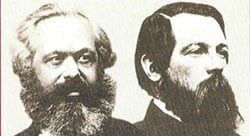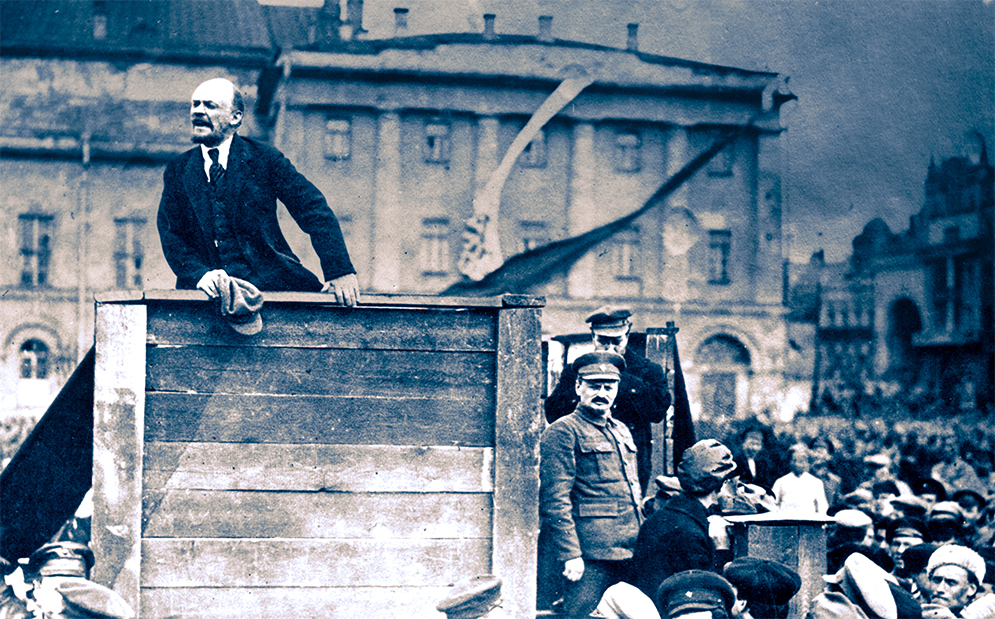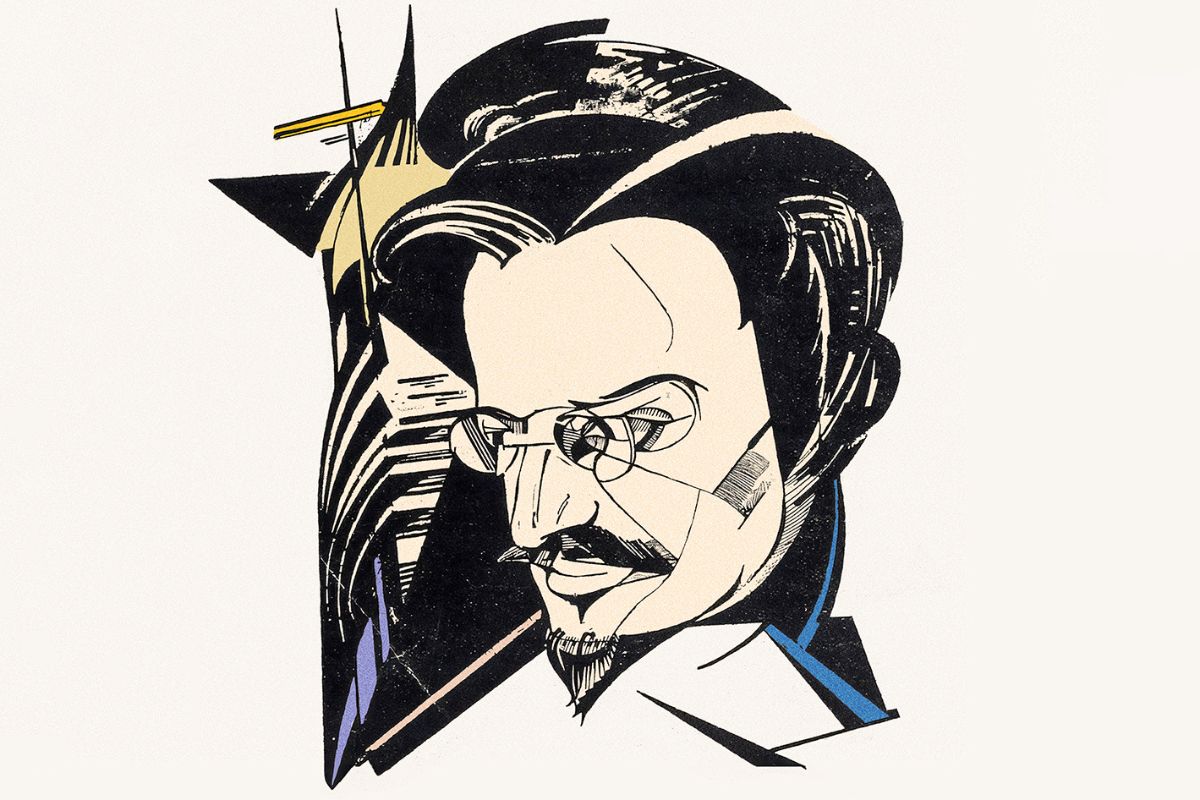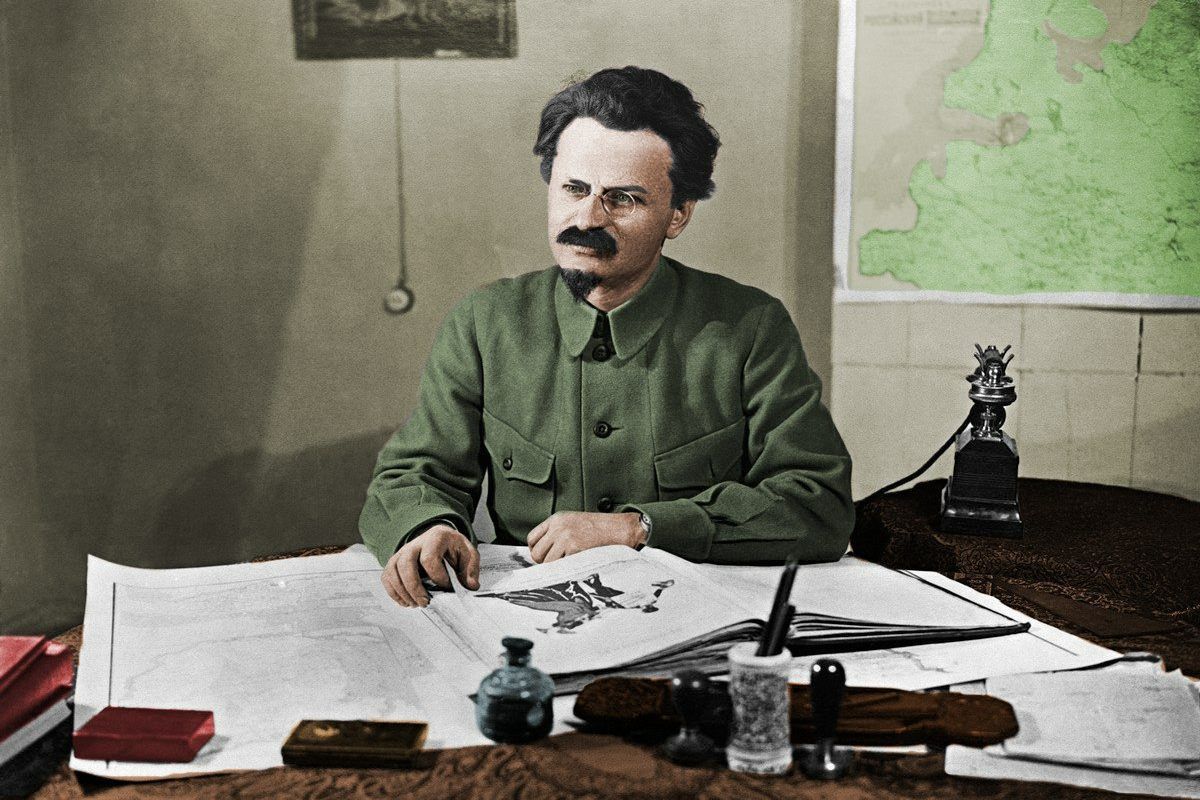| Marx and Engels |
As young men, Marx and Engels came
out of the German philosophical tradition. They were at this time groping their
way to becoming revolutionary activists. In 1845 Marx and Engels set out their
revolutionary world view for the first time in a book, The German Ideology,that
settled accounts with the Hegelian tradition from which they had just emerged.
It points the way to the clear language of the Communist Manifesto, published in 1848 and addressed to the workers
of the world.
“The philosophers have only
interpreted world in various ways; the point however is to change it” (Marx: 11th
Thesis on Feuerbach).
Here, Marx does not dismiss the
role of philosophy as it is commonly misconceived. In fact, the statement from
‘The Theses on Feuerbach’, points towards the Marxian shift in philosophical
interpretation. For Marx philosophical problems can only be solved “by
remoulding the world to resolve the contradictions inherent within it” (Singer,
P. ‘Marx’ (Oxford University Press)
His revision of the Hegelian dialectic places the notion of
‘contradiction’ in a central role throughout his analysis, which proposes that
history is driven by conflicts which are resolved in a dynamic process of
change. However, Marx makes a radical departure from Hegelianism. In a savage
attack on the idealism of his contemporaries, he rejects the “the illusions of
German ideology” (Marx, K. and Engels, F ‘The German Ideology’).
Importantly, the German use of the term ‘ideology’, had come to refer to
“systems of ideas detached from, and out of proportion to empirical identity” (Wood
A.W., Karl Marx from ‘The Oxford
Companion to Philosophy’ Oxford University Press).
In opposition to Hegel, Marx builds a conceptual method on
material foundations, and philosophy on this basis takes a truly practical
form. He dismissed the abstractions of Hegelian thought, pointing out that they
fail to make the necessary “relation of their criticism to their own material
surroundings” (German Ideology). For Marx ideology is rooted in material
processes, even the illusions of idealism stem from reality. He explains, “if
in all ideology men and their circumstances appear upside-down as in a ‘camera
obscura’, this phenomenon arises just as much from their historical life
process as the inversion of objects on the retina does from their physical
life-process.” (Marx argues that ideas do not exist independently of this
process, so the Hegelian dialectic is such an inversion, where ideas are held
prior to, and impose on material conditions. The Marxist method claims to right
this wrong.)
Marx opens the ‘Communist
Manifesto’, with the declaration that “the history of all hitherto existing
society is the history of class struggles.” Placing emphasis on the social in
historical development, he rejects the idealist account which attributes change
to individuals. Class conflict, for Marx, is the dialectical contradiction
which generates the progress of
society. Importantly, he believes that the process has shown the ‘ultimate
tendency of history…..the Promethean drive of the human species to develop
its essential human powers…..of production’ (Wood). Despite appearances to
the contrary, there are no a priori assumptions here. Marx, by his own maxim,
claims to draw these conclusions from an analysis of the socio-economic
character of capitalism.
Though Marx does not consider
history to be linear, progressing towards an ultimate goal as Hegel does, he
identifies specific stages. Capitalism signifies the latest historical stage,
with its own peculiarities like feudal society and others before it. However,
“class antagonisms” (Communist Manifesto) remain, albeit in a different form.
This is based on the assertion that each stage “sprouted from the ruins” (ibid)
of those previous to it. In the Manifesto, Marx shows how capitalism “has
created more massive and colossal productive forces than all preceding
generations put together” (ibid). Such is the impetus of the “socialised
production” (Engels Socialism Utopian and Scientific) of capitalist industry.
This is unique in that it creates a new focus of conflict, the ‘proletariat’ or
‘working class, and the ‘bourgeoisie’ or ruling class. The socialised mode of
production is contradicted by unequal distribution, under capitalism. Put
crudely, while the former makes the wealth, the latter takes the wealth, and it
is these conditions, Marx argues, that create the crisis inherent in the
system.
The viability of capitalism is in
constant question with “commercial crises” spelling unemployment, low wages and
eventual “pauperism” (Communist Manifesto) of the workers. This is due to the
essential tendency of the capitalist economy to periodic ‘boom and slump’, in
which overproduction floods the market creating unemployment and driving down
concessions given to the workers in times of economic stability. However, the
classes have a dialectical unity of contradiction, in that they despite their
dissension, they rely on each other essentially for their existence. According
to Marx, without the productive power of the proletariat, wealth cannot be
produced, and without this wealth the bourgeoisie cannot exist.
Marx asserts that capitalism leads
to the concentration of wealth, in fewer and fewer hands, rendering the “great
mass of humanity propertyless” (German Ideology). This shows the decline that
Marx attributes to the existence of private property. He calls for its
abolition in the Manifesto, as it is the basis of ‘alienation’ and thus, the
class system. Again, this is not founded on abstraction, but practical
reasoning drawn from concrete considerations. ‘Alienation’ is central to the
Marxian conception of class relations to production, and the historical
possibilities that this throws up for the proletariat. According to Marx, capitalism
“has simplified the class antagonisms” (Communist Manifesto) that result from
the existence of private property. He goes on, stating that capitalism, “has
left no other nexus” between humans, “than naked self-interest, than callous
cash payment” (ibid).
In light of such considerations,
Marx argues that capitalism de-humanises, that it “has resolved personal worth
into exchange value” (ibid). The worker, with only his labour to sell and not
enough in wages to be able to buy back what he has produced, does not reap the
rewards of his work. These are taken by the ruling class. Thus, he is caught up
in a process of alienation of production from what he has produced, as a mere
“appendage to the machine” (ibid). The division of labour under capitalism
whereby “a cleavage exists between particular and common interest” (German
Ideology), makes work entirely external from the worker’s interests. Hence,
alienation is a systemic feature of capitalism.
The “division of material and
mental labour” (German Ideology) has an alienating effect, that ideas are
produced by the bourgeoisie in their own interests, which conflict with the
reality of working life. The dominant religious, philosophical and ethical
ideas, all serve to justify the subordination of the masses to the ruling
class. This is based on the assumption that “the class which is the ruling
material force of society is at the same time its ruling intellectual force”
(ibid). According to Marx, the proletariat are subject to the force of
bourgeois ideology, but are compelled to eventually throw off its illusions.
The worker feels “ruined in this
alienation” (Singer), dehumanised and miserable. Although, recognised by the
bourgeoisie, they do not suffer, feeling “comfortable and confirmed…..knowing
that this alienation is its own power”(ibid). However, the degeneration of
human value is the key to the regeneration of social relations. Marx draws
revolutionary conclusions from alienation, binding theory and practice tightly
together in a method which purports to be scientific. Engels outlines this
claim, demarcating between ‘Socialism Utopian and Scientific’, in the essay of
the same name. He shows how the contradictions in capitalism, by definition,
can only be resolved by a revolutionary movement of the working class,
overthrowing the bourgeoisie. Private property, the basis of class is “driven
towards its own dissolution”, forcing the Proletariat to become “conscious of
its dehumanisation” (ibid). With these discoveries, Engels argues, the
political ideal of “socialism became a science” (Socialism Utopian and Scientific).
Marx’s critique of capitalism is highly polemical, but it
does not proceed from idealised or utopian assumptions about human beings. Nor
does it attempt to predict future society. As Marx plainly states, “communism…..is
not a state of affairs which is to be established, an ideal to which reality
[will] have to adjust itself” (German Ideology). Progress to a higher stage of
human development i.e. cmmunism, is “the real movement which abolishes the
present state of things” (ibid). Ultimately, the revolutionary movement of the
Proletariat. Importantly, any movement of class against class is the “result of
the premises now in existence” (ibid) it stems from the Capitalist system
itself. This is not to say that revolution is ‘inevitable’, another popular
misconception in interpretations of Marx. Nevertheless, what is inevitable are
‘revolutionary opportunities’. This indicates that conscious human actions do
play a role in shaping history.
However, human thought and
action, from the passive to most revolutionary, is firmly grounded by Marx in
the material production of the given society. In this sense, human beings are
bound by the society they belong to, and by its particular class relations. The
poletariat has a revolutionary character determined by social conditions in
which it eventually “has nothing to lose” (Communist Manifesto). Marx argues
that it is compelled to take on its enemy, the bourgeoisie, whose system by its
very nature exacerbates the conditions that threaten its existence. The ruling
class, despite their immense wealth become “incompetent to assure an existence
to its slave within his slavery” (ibid. This is displayed with literary flair
in the Manifesto, which states that, ‘the bourgeoisie produces…..its own
grave-diggers’ (ibid) in a revolutionary Proletariat.
Marx
does not attempt to predict what future society will look like, as he believes
that given the dynamics of historical change, it will be brought under full
human control. Winning the position of the ruling class by force, “the proletariat
will use its political supremacy to wrest by degrees, all capital from the
bourgeoisie, to centralise all instruments of production” (Communist Manifesto).
For Marx, this is the initial stage of revolutionary change, but it should by
no means be considered as an end or final goal. Revolution would abolish
private property and accordingly the class system, but it reaches still
further. The result Marx argues, is “the historical development of human
society created consciously by human beings” (Wood). This would take human
existence to a higher level, where the social, political and economic spheres
are directed by, and in the interests of, humanity as a whole.






